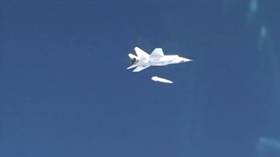Seoul summons senior Japanese diplomat to protest persistent inclusion of disputed islets on Olympic torch relay map
The South Korean Foreign Ministry has summoned a senior Japanese diplomat to protest a map published on the Tokyo Olympic Games website, which seemingly pressed Japan’s claim over Korea-controlled islets.
Lee Sang-ryeol, director-general for Asia and Pacific affairs in the South Korean Foreign Ministry, called in Hirohisa Soma, deputy chief of mission at the Japanese Embassy in Seoul, to formally protest the latest development in the territorial dispute.
“We will strongly protest Japan’s unfair territorial claims to Dokdo and also stress that an immediate correction be made to the material,” a spokesperson for the ministry said, as cited by news agency Yonhap.
Also on rt.com South Korea protests over inclusion of disputed islands on Tokyo 2020 Olympic torch relay map, politicians propose Games boycottThe inclusion of the disputed islets on a Japanese torch relay map first stirred anger in Seoul and a formal protest in July 2019. The organizing committee consequently revised the map, but the new edition came under fire in South Korea last month.
It reportedly started with Professor Seo Kyung-duk of Sungshin Women's University, a civic activist who accused the Japanese side of simply making the islets barely visible. A tiny dot appears to be present on the current version of the map in the place of the contested rocks.
Last Friday, amid a backlash from the Korean public, the Foreign Ministry said it “will not tolerate” the situation.
Also on rt.com No eating, drinking & cheering? Japan mulls more restrictions for fans at Tokyo Olympics besides tests & proof of vaccinationKnown as Liancourt Rocks internationally, Dokdo in South Korea, and Takeshima in Japan, the uninhabited islets lie in the Sea of Japan at a roughly the same distance from both the Korean Peninsula and Japan’s largest Honshu Island. They are under the effective control of Seoul. The Japanese government routinely protests Korean activities in the area, such as military patrols or research activities, as violating its sovereignty.
The ongoing dispute stems from differing views on whether the renunciation of sovereignty over territories occupied by imperial Japan, which Tokyo proclaimed after its defeat in World War II, covered the Liancourt Rocks.
If you like this story, share it with a friend!














